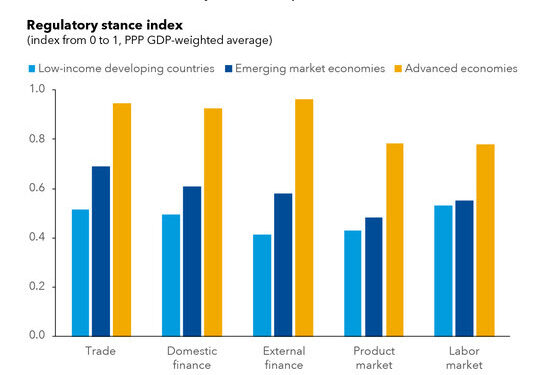Market reforms can stabilize debt and foster growth in developing countries
The global economy has experienced multiple shocks in the past three years. Emerging markets and developing economies not only need to reignite growth and secure a full recovery, but they also must manage rising debt and other policy considerations.
Regulatory changes and other market reforms can ease this challenge, as we outline in a new staff discussion note. Examples include lowering barriers to entry in utilities markets, establishing financial supervision and regulatory frameworks, and lowering restrictions on foreign exchange transactions and cross-border capital flows.
Major changes in regulations are associated with a 3 percentage point reduction in the ratio of debt to gross domestic product, according to our analysis. This decline in a key measure of debt burdens takes place not only by increasing GDP, but also by improving public finances through higher tax revenues and lower borrowing costs. The effect we estimate is comparable to the effect of major fiscal consolidations, as outlined this year in chapters of our World Economic Outlook and Fiscal Monitor.
Overlooked debt lever
The typical first step toward stabilizing debt is to reduce new borrowing through fiscal consolidation or to decrease the total outstanding through debt restructurings. However, debt-to-GDP ratios can also be cut by increasing the denominator: economic output. One way to accomplish this is with improved market functioning, as IMF research showed in 2016 and 2019.
The IMF Structural Reform Database, covering 90 advanced and developing economies over the past four decades, measures how markets work in five broad areas: trade, domestic finance, external finance, product market and labor market. Due to the large gap in how well markets function between advanced and developing economies, there is considerable scope for governments to use market reforms as a policy lever to revitalize growth and reduce debt burdens in developing economies. Enacting changes in regulations that aim at improving how markets work, for example by increasing competition or establishing appropriate regulatory frameworks, can boost economic output.
Our research shows that improved market functioning not only lowers the debt ratio through the denominator effect, but also strengthens fiscal outcomes and helps reduce new borrowing. However, some market-oriented policies, such as lowering trade barriers, could have the opposite of the intended effect on fiscal accounts. Scrapping tariffs, for example, would—at least in the short term—reduce tax revenue and could in turn increase debt. This may be partially offset in the longer term, however, by increased economic activity.
How reforms stabilize debt
We find that gains from reforms materialize through higher tax revenues and narrower sovereign debt spreads. The higher tax revenues likely reflect that the effect of improving economic activity makes up for lost revenues directly linked to reforms. The lower borrowing costs instead reflect the improvement in investors’ confidence after the reforms.
Our analysis also shows that some reforms work better than others. For example, the debt reduction associated with reforms is larger when governments are better at collecting taxes, have higher initial debt, and implement reforms during an economic expansion. This means that, while reforms help reduce debt on average, that’s not always true in every circumstance.
Another factor dampening the gains from reforms is increased government spending. Historically, developing countries have used some of the fiscal gains from reforms to fund other policy initiatives. Challenges from the political dynamics during the implementation period have also limited the fiscal gains. Spending carefully, then, is a key factor for reforms to successfully reduce debt ratios.
Ultimately, ensuring that reforms strengthen debt sustainability calls for several policy considerations:
- Countries’ initial debt burdens and potential inequality effects are important factors in deciding how fiscal gains from reforms can be directed toward debt reduction, growth-friendly spending, or income inequality concerns.
- Improving efficiency in tax collection can enhance the gains of an enlarged tax base, for example by investing in digital infrastructure, governments can strengthen revenue mobilization and improve spending efficiency, as noted in a recent IMF report.
- Another factor dampening the gains from reforms is increased government spending. Historically, developing countries have used some of the fiscal gains from reforms to fund other policy initiatives. Challenges from the political dynamics during the implementation period have also limited the fiscal gains. Spending carefully, then, is a key factor for reforms to successfully reduce debt ratios.
Overall, reforms are essential to improve how markets work and spur long-term growth. Our research finds that such reforms also have an important potential to help countries navigate the challenging balancing act of supporting growth while stabilizing debt that many emerging market and developing economies currently face.











